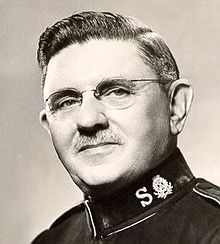Saviour, if my feet have faltered
On the pathway of the cross,
If my purposes have altered
Or my gold be mixed with dross,
O forbid me not Thy service,
Keep me yet in Thy employ,
Pass me through a sterner cleansing
If I may but give Thee joy!
All my work is for the Master,
He is all my heart’s desire;
O that He may count me faithful
In the day that tries by fire!
Have I worked for hireling wages,
Or as one with vows to keep,
With a heart whose love engages
Life or death, to save the sheep?
All is known to Thee, my Master,
All is known, and that is why
I can work and wait the verdict
Of Thy kind but searching eye.
I must love Thee, love must rule me,
Springing up and flowing forth
From a childlike heart within me,
Or my work is nothing worth.
Love with passion and with patience,
Love with principle and fire,
Love with heart and mind and utterance,
Serving Christ my one desire.
Such wistful, self-examining, yet consecrating words! Albert Orsborn wrote them after a difficult time in his Salvation Army career. He had been in charge of a very successful “division” – the term for an area comprised of many corps (churches) and social services. The administration decided that this large area should be halved, and Orsborn felt disheartened that some of his responsibility would be removed. He even considered resigning! Soon afterward, he became ill, and also fell and broke his foot. While recovering, he heard a group nearby singing the words: “Nothing from His altar I would keep.” The thought touched his heart and inspired him to write the above song and resume his duties for the Lord.
“Nothing from His altar I would keep.” Share on X Albert Orsborn was the son of Salvation Army officers who helped pioneer the Army’s work in Norway. Albert worked for a time at International Headquarters in London, England. At the age of sixteen, he won a songwriting contest held by the Army’s magazine, The War Cry . He trained as an officer and held various appointments, including corps, training college and divisional work, as well as becoming Chief Secretary in New Zealand and Territorial Commander of Scotland and Ireland. He was British Commissioner from 1940 – 1946, when he was elected General. General Orsborn retired in 1954, spending his retirement years in the lovely coastal city of Bournemouth, England. He was promoted to Glory in 1967. An anthology of his songs has been published: The Beauty of Jesus , as well as his autobiography, The House of My Pilgrimage .
Albert Orsborn was the son of Salvation Army officers who helped pioneer the Army’s work in Norway. Albert worked for a time at International Headquarters in London, England. At the age of sixteen, he won a songwriting contest held by the Army’s magazine, The War Cry . He trained as an officer and held various appointments, including corps, training college and divisional work, as well as becoming Chief Secretary in New Zealand and Territorial Commander of Scotland and Ireland. He was British Commissioner from 1940 – 1946, when he was elected General. General Orsborn retired in 1954, spending his retirement years in the lovely coastal city of Bournemouth, England. He was promoted to Glory in 1967. An anthology of his songs has been published: The Beauty of Jesus , as well as his autobiography, The House of My Pilgrimage .
WORDS: ALBERT ORSBORN MUSIC: TUNES – THE VACANT CHAIR: GEORGE ROOT- FACE TO FACE: GRANT TULLAR
S.A. SONG BOOK, 2015 EDITION, #672; 1987 EDITION, #522
REFERENCE: S.A. SONG BOOK WEBSITE: usawest.org






